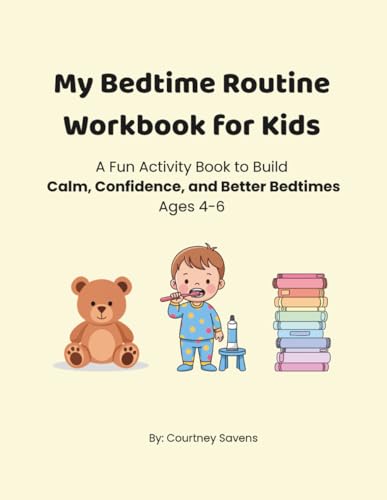To establish healthy sleep habits, create a consistent bedtime routine that signals it’s time to wind down, like brushing teeth, changing into pajamas, and relaxing activities. Limit screen time at least an hour before bed and make the sleep environment cozy and quiet. Stick to the same schedule every day, including weekends, to help regulate your child’s internal clock. If you keep these habits up, you’ll discover simple ways to improve your child’s sleep for better days ahead.
Key Takeaways
- Establish a consistent bedtime routine that includes calming activities like reading and brushing teeth to signal winding down.
- Turn off screens at least an hour before bed to reduce blue light exposure and promote melatonin production.
- Maintain a regular sleep schedule every day, including weekends, to regulate your child’s internal clock.
- Create a comfortable, quiet, and dimly lit sleep environment with cozy items for added security.
- Be patient and persistent with routines, as consistent habits improve sleep quality, mood, and overall health over time.

Getting enough quality sleep is vital for your child’s growth, development, and daily performance. One of the most effective ways to guarantee your child gets restful sleep is by establishing consistent bedtime routines. These routines help signal to your child’s brain that it’s time to wind down, making it easier for them to fall asleep and stay asleep through the night. A good bedtime routine should be predictable and calming, including activities like brushing teeth, changing into pajamas, and reading a story together. When your child knows what to expect every night, it creates a sense of security that promotes better sleep habits.
In addition to creating a routine, managing screen time limits is essential. Exposure to screens—like tablets, smartphones, or television—before bed can interfere with your child’s ability to fall asleep. The blue light emitted from screens suppresses melatonin, the hormone that regulates sleep, making it harder for your child to feel sleepy. To promote healthy sleep, set a specific time when screens are turned off each evening, ideally at least an hour before bedtime. Encourage your child to engage in relaxing activities instead, such as reading a book, drawing, or listening to calming music. These activities help their mind unwind and prepare for sleep without the stimulation of screens.
Furthermore, consistency is vital. Try to keep bedtimes and wake-up times the same every day, even on weekends. This regularity helps regulate your child’s internal clock, making it easier for them to fall asleep naturally. When your child’s body becomes accustomed to a routine, they’ll start feeling sleepy and alert at more predictable times. It’s also helpful to create a sleep-friendly environment—dim lighting, a comfortable bed, and a quiet room. Removing distractions and ensuring a peaceful space reinforces the routine and signals that it’s time to rest.
Additionally, choosing the right yarn for scarves can contribute to creating a cozy and inviting sleep environment, especially if your child enjoys handmade blankets or pillows. Lastly, be patient and persistent. Changing sleep habits can take time, especially if your child is used to irregular routines or screen time excesses. Consistently enforcing bedtime routines and screen time limits, and providing a calm, supportive environment, will gradually help your child develop healthy sleep habits. Remember, quality sleep not only improves their mood and concentration but also supports their overall health and well-being. By establishing a structured bedtime routine and limiting screens before bed, you’re setting your child up for better sleep and brighter days ahead.

My Bedtime Routine Workbook for Kids: A Fun Activity Book to Build Calm, Confidence, and Better Bedtimes (Calm Routines Workbook Series)
As an affiliate, we earn on qualifying purchases.
As an affiliate, we earn on qualifying purchases.
Frequently Asked Questions
How Can I Help My Child Fall Asleep Faster?
To help your child fall asleep faster, create a calming sleep environment by keeping the room dark, cool, and quiet. Incorporate bedtime stories into the routine to relax their mind and establish a sense of comfort. Avoid screens before bed and stick to a consistent schedule. These steps signal that it’s time to wind down, making it easier for your child to drift off more quickly.
What Should I Do if My Child Resists Bedtime?
Imagine bedtime as a gentle lighthouse guiding your child safely to sleep. When they resist, try calming techniques like a cozy story or soft music to ease their worries. Implementing bedtime strategies such as consistent routines and a calm environment helps reduce resistance. Stay patient and gentle, showing them the lighthouse’s steady glow, and soon they’ll feel secure enough to relax and drift off peacefully.
Are There Specific Foods That Promote Better Sleep?
You might wonder if certain foods can help your child sleep better. Sleep promoting foods like bananas, cherries, and warm milk contain natural compounds that encourage relaxation. Offering healthy bedtime snacks can also prevent hunger and help your child settle down for sleep. Just avoid sugary or caffeinated foods close to bedtime, and stick to light, calming options to support a peaceful night’s rest.
How Much Sleep Is Appropriate for My Child’s Age?
You’re wondering about your child’s sleep duration and what’s appropriate based on age guidelines. For school-age kids, aim for 9-12 hours of sleep each night, depending on their individual needs. Younger children may need closer to 10-12 hours, while older kids might be fine with around 9-10 hours. Following these age guidelines helps make sure your child gets enough rest to support their growth, learning, and overall health.
Can Screen Time Before Bed Affect Sleep Quality?
Have you ever noticed how screens seem to steal sleep away? Screen time before bed can definitely affect sleep quality because the blue light from devices interferes with melatonin production. When you let your child use screens right before bedtime, it can make falling asleep harder and disrupt their rest. To improve sleep quality, try limiting screen time at least an hour before bed, helping your child wind down naturally.

BGment Kids Blackout Curtains for Boys Bedroom, Star Curtains Thermal Insulated Grommet Window Drapes for Nursery, Set of 2 Panels (42 x 63 Inch, Navy Blue)
Package Includes: Set of 2 navy kids curtains; Each panel measures 42 Inch wide by 63 Inch long….
As an affiliate, we earn on qualifying purchases.
As an affiliate, we earn on qualifying purchases.
Conclusion
Just like the stars need the night sky to shine, your child needs healthy sleep routines to thrive. By establishing consistent bedtimes and calming routines, you set the stage for their brightest days ahead. Remember, a good night’s sleep isn’t just about rest—it’s about fueling their dreams and growth. With these habits, you’ll help them harness the power of the night, turning bedtime into a peaceful journey towards a brighter tomorrow.

COZYBONDER Toddler Airplane Bed & Travel Essentials – Kids Airplane Seat Extender, Portable Plane Bed for Flights
【Toddler Airplane Travel Essentials】 This toddler airplane bed takes the travel experience to new heights by serving as…
As an affiliate, we earn on qualifying purchases.
As an affiliate, we earn on qualifying purchases.

Night Light for Kids,Boys Toys for 3 4 5 6 7 8 Year Old Boys,Star Projector 360 Degree Rotation – 4 LED Bulbs 16 Light Color Changing with USB Cable,Lamp Ceiling Lights for Kids Bedroom
UNIQUE DESIGN — Please open the cover, the star theme inside can be perfectly displayed,Unlike other products, our…
As an affiliate, we earn on qualifying purchases.
As an affiliate, we earn on qualifying purchases.









